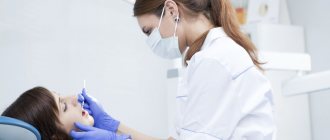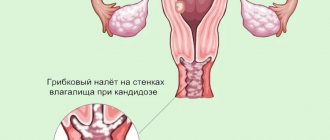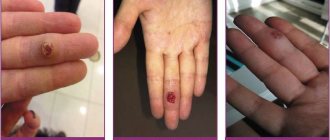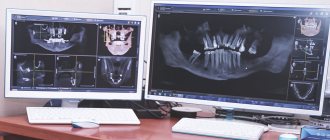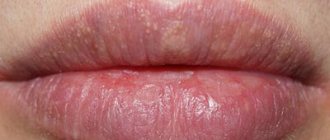Candidiasis provokes eczema, changes in stool, and headaches. Candidiasis greatly suppresses the immune system and this makes it very dangerous.
The disease caused by fungi of the genus Candida is one of the most common lesions of the lower genital tract in girls. According to the luminaries of domestic pediatric gynecology, Candida fungi are found in more than half of the cases of chronic recurrent vulvovaginitis in preschool girls and in 24-25% of adolescents with inflammatory diseases of the genital organs (M.N. Kuznetsova, 1998; Yu.A. Gurkin, 2000).
Fungi of the genus Candida are permanent representatives of the human microflora. But under certain conditions (decreased immunity, dysbacteriosis, impaired lipid and salt metabolism), yeast-like fungi acquire vegetative (growing) forms.
Fungi of the genus Candida can infect mucous membranes, skin, legs, and internal organs.
Candidiasis provokes eczema, changes in stool, and headaches. Candidiasis greatly suppresses the immune system and this makes it very dangerous.
Diagnosis and treatment of thrush at the Yauza Clinical Hospital
Diagnostics
Diagnosis of vaginal candidiasis begins with interviewing the patient.
Some gynecological (bacterial vaginosis, inflammatory processes in the female reproductive system) and concomitant diseases (diabetes mellitus, candidiasis and intestinal dysbiosis, etc.) are important. It is not uncommon for thrush to develop after long-term use of antibiotics, hormones, or immunosuppressants. Upon examination, a characteristic clinical picture is revealed - a white coating on the inflamed mucous membrane of the genital organs, copious, curdled discharge. Examination of a vaginal smear reveals fungal flora. If necessary, a culture is carried out to determine the type of fungus and its sensitivity to antifungal drugs (cultural analysis). Among additional studies, examination for sexually transmitted infections, diabetes mellitus and diagnosis of intestinal microflora may be recommended. Make an appointment with a gynecologist
Treatment
How to cure thrush?
General and local antimycotic therapy Gynecologists at the Yauza Clinical Hospital provide effective treatment for thrush in women. Today there are many medications to combat candidiasis: oral medications, creams, vaginal tablets, suppositories for thrush. Among the most popular drugs for vaginal candidiasis are flucostat, fluconazole (oral tablets), clotrimazole (vaginal tablets or cream), pimafucin (suppositories) and many other drugs. Your doctor should choose the optimal treatment regimen for you.
Reducing the role of predisposing factors To avoid relapses, it is necessary to identify and eliminate factors contributing to the disease. If possible, stop taking glucocorticosteroids and cytostatics. For diabetes mellitus, adjust blood glucose levels with medication. Restore normal microflora in the intestines. In addition, you need to take antibiotics with caution. Exacerbation/recurrence of thrush after or during a course of antibiotic therapy is common. Therefore, taking antibiotics must be combined with taking antifungals and probiotics. It is necessary to maintain personal hygiene, maintain immunity, and avoid stressful situations.
Sexual life with thrush Many people are interested in whether it is possible to be sexually active with thrush and its treatment? You can protect yourself with a condom. To achieve good results, it is often recommended to undergo treatment of vaginal candidiasis together with your sexual partner.
Causes of the disease
The main reasons for the development of urethritis in children are:
1. Reduced immune defense of the body.
2. Medical procedures:
- urethral smear;
- cystoscopy - examination of the bladder using a special device in the body of which a camera is mounted;
- catheterization - insertion of a special tube (catheter) into the bladder for rinsing, administering medications, and removing urine.
3. Hypothermia.
4. Poor nutrition (irritation and inflammation of the urethra occurs as a result of abuse of sour, spicy, salty, pickled foods).
5. Failure to comply with intimate hygiene rules.
6. Infectious and inflammatory pathologies of the genitourinary system:
- pyelonephritis (inflammation of the kidneys, usually caused by a bacterial infection);
- cystitis (inflammation of the bladder);
- inflammation of the external genitalia in girls;
- balanoposthitis (inflammation of the glans penis), prostatitis (inflammation of the prostate gland) in boys.
7. Congenital anomalies of the development of the urinary system.
Thrush during pregnancy
The development of vaginal candidiasis during pregnancy is dangerous for the expectant mother and the fetus. There is an increasing threat of the development of inflammatory processes during pregnancy, postpartum complications, and infection of the fetus, which can lead to fungal infection of its organs and even death. It is possible that the baby may become infected during childbirth. Treatment of thrush in pregnant women is complicated by the ban on taking antifungal drugs orally. Local treatment with vaginal tablets and suppositories is acceptable (Pimafucin is considered the safest among them during pregnancy). All the more important is the observance of personal hygiene rules, as well as protection from stress, proper nutrition with sufficient vitamins, walks, healthy sleep, which help strengthen the natural immune defense. If signs of thrush appear in a pregnant woman, she should immediately contact an obstetrician-gynecologist in order to carry out timely, adequate treatment and avoid complications.
For diagnosis and successful treatment of vaginal candidiasis, come to the Clinical Hospital on Yauza. You can see
prices for services Make an appointment
Acipol
* For dysbacteriosis
1. According to IQUIA Solutions LLC data for January – December 2022. The average retail price for the drug Atsipol is 352 rubles 84 kopecks
2. O. V. Molochkova, O. V. Kladova, A. A. Novokshonov, N. L. Valts, Yu. V. Kompaniets, N. L. Grishkevich. Prevention of antibiotic-associated diarrhea in children with a lactose-containing probiotic. Children's infections 2016, No. 4, S 37-411
3. List of studies conducted:
Novokshenov A. A., Molochkova O. V. et al. The use of a domestic probiotic containing Lactobacillus acidophilus for the treatment of acute intestinal infections and other pathologies in children. Therapy issues. Children's infections 2022, No. 1. Kladova O. V. et al. Preventive and therapeutic effectiveness of Acipol for antibiotic-associated diarrhea in children // Children's infections. – 2009. – No. 2. – P.44-47. Maev I.V. et al. Possibilities for the prevention of idiopathic antibiotic-associated diarrhea in adults. //Russian Journal of Gastroenterology, Hepatology, Coloproctology. – 2009. – No. 2. – pp. 75-78. Novokshonov A.A., Sokolova N.V., Berezhkova T.V., Sakharova A.A. Clinical effectiveness of the probiotic “Acipol” in the complex therapy of acute intestinal infections of bacterial, viral and viral-bacterial etiology in children // Children's infections. – 2009. – No. 4. – P. 61-65. Barmina O.S., Gorelov A.V., Usenko D.V., Ardatskaya M.D. Clinical and laboratory effectiveness of the multiprobiotic drug Acipol in the complex therapy of “invasive” acute intestinal infections in children // Infectious diseases. – 2009. – T.7, No. 1. – p.76-79. Bulanova I.A. Rationale for the use of lactose-containing probiotics for acute watery diarrhea in young children. Abstract. diss. Ph.D. honey. Sci. - Arkhangelsk, 2008. - 24 p. Yurlova E.V., Grigorovich M.S., Chastoedova I.A. State of enzyme secretion function in acute intestinal infections in children against the background of probiotic correction // Questions of practical pediatrics. – 2011. – T. 6, No. 3. - With. 97–101 Feklisova L.V. The use of lactose-containing probiotics: an assessment of the long-term use of Acipol in pediatric practice // Pediatrics. – 2007. – No. 2. – P. 123-127. Oleinichenko E.V., Mitrokhin S.D., Nonikov V.E., Minaev V.I. The effectiveness of acipol in the prevention of intestinal dysbiosis during antibacterial therapy // Antibiotics and chemotherapy. – 1999. – No. 1. – P.23-25. Volodko N.A., Konstantinova A.V., Klimenko N.Yu. Comparative effectiveness of drugs with different effects on the intestinal biocenosis in patients with respiratory tuberculosis // International Journal on Immunorehabilitation. - 2010. - T. 12. No. 2. - P. 120-121. Tselipanova E.E., Shebekova V.M., Savitskaya K.I., Rusanova E.V., Matveevskaya N.S. Clinical and immunological effectiveness of Acipol in children with acute respiratory infection // Almanac of Clinical Medicine. - 2002. - No. 5. - P. 260-264. Savenkova M.S., Afanasyeva A.A. Treatment of infections: antibacterial and probiotic effects // Pediatrics. - 2008. - No. 1. - P. 38-40. Gordeets A.V., Piskunova S.L., Chernikova A.A. Optimization of ARVI therapy in children during an influenza pandemic // Children's infections. - 2011.- No. 4. -P.52-56. Kushnareva M.V., Dementyeva G.M., Feklisova L.V., Chernogor I.N. The influence of eubiotic drugs on local intestinal immunity in premature infants with infectious and inflammatory diseases. // Pediatrics. - 2003. - No. 3. - P. 11-14. Novikova V.P., Gurova M.M., Tsekh O.M. Complex treatment using probiotics based on lactobacilli in children with chronic gastroduodenitis in remission. Advanced medical technology. - St. Petersburg, 2010. - 24 p. Nikitina L.V., Kalutsky P.V., Lazarev A.I., Besedin A.V. The effectiveness of the use of a probiotic (Acipol) in the complex therapy of chronic gastroduodenitis associated with H. Pylori in children //International Journal on Immunorehabilitation. - 2010. - T. 12. No. 2. - P. 220b-220b. Revnova M. O. Efficacy of Acipol in the treatment of children with celiac disease // Pediatrics. Consilium medicum. – 2009. – No. 1. – p.58-59. Oreshko L.S., Matveeva I.I., Ivanova O.I., Prokofieva N.A., Balagaeva M.S. On the issue of the immunomodulatory effect of the drug Acipol in complex pathogenetic therapy in patients with celiac disease // Diseases of the digestive organs. – 2009.- No. 2.- P.63-65. Kryuchkova T.A. et al. Clinical effectiveness of the probiotic Acipol in children suffering from atopic deramatitis. // Scientific bulletins of BelSU. Series: Medicine. Pharmacy. 2012. No. 22 (141). Shuster A.M. et al. Possibilities for optimizing the use of probiotics in clinical practice using the example of the domestic drug Acipol®. RMJ. 2009, No. 4. Kornienko E.A., Saburova A.V. Experience with the use of the probiotic Acipol in the complex therapy of gastroduodenitis with bacterial overgrowth syndrome in the small intestine. Children's infections. 2022.-N 3.-P.46-50.
Perlamutrov Yu.N., Olkhovskaya K.B., Ivashkina N.Yu., Shuster A.M., Martyanov V.A. The influence of probiotics on the functional state of the epidermal barrier of facial skin // Bulletin of Dermatology and Venereology. - 2008. - No. 4. - P. 80-83.
4. The drug Atsipol, capsules LS-001915 has been registered in the Russian Federation since 2006, according to the State Register of Medicines of the Russian Federation. Consumer loyalty has been confirmed according to data from Mediaskop JSC, January-June 2019
Types of disease
Due to their occurrence, the following types of urethritis are distinguished:
1. Infectious. Occurs as a result of exposure to pathogenic and opportunistic microflora:
- nonspecific - caused by Escherichia coli, staphylococci, streptococci;
- specific - caused by specific pathogens (chlamydia, gonococci, Trichomonas and others).
2. Non-infectious. Occurs as a result of allergic reactions, injuries to the urethra.
Based on the type of pathogen, the following types of urethritis are distinguished:
- gonorrheal (caused by gonococcus);
- non-gonorrheal (causative agents are viruses, bacteria, protozoa, fungi of the genus Candida).
According to the localization of inflammation, urethritis is:
- posterior (the back of the urethra is affected);
- anterior (the anterior part of the urethra is affected);
- total (the entire urethra is affected).
According to the mechanism of development, the following types of disease are distinguished:
- primary urethritis - inflammation begins in the urethra;
- secondary urethritis - the infection enters the urethra from another source of inflammation, which can be located in the bladder, head of the penis, vagina, or prostate gland.
According to the clinical course, urethritis can be acute (up to 14 days) and chronic (14 days or more). The chronic form of the disease usually develops in the absence of timely therapy.
Consequences of urethritis
If therapy is not started in time or the disease is not treated, then urethritis can become chronic. In addition, the inflammatory process can spread to neighboring organs, which leads to the following pathological conditions of the body:
- pyelonephritis (kidney inflammation);
- balanoposthitis (inflammation of the foreskin and head of the penis in boys);
- cystitis (inflammation of the bladder);
- prostatitis (inflammation of the prostate gland);
- orchitis (inflammation of the testicles);
- vulvitis (inflammation of the mucous membrane of the external reproductive organs in girls).
Chronic urethritis in adulthood can cause infertility.
Sources:
- Urinary tract infection in children: what a pediatrician and nephrologist needs to know. Zakharova I.N., Osmanov I.M., Mumladze E.B., Svintsitskaya V.I., Bekmurzaeva G.B. Medical Council No. 14, 2015. p. 114-118
- Pharmacotherapy of urinary tract infections in children. Korovina N.A., Zakharova I.N., Zaplatnikov A.L., Mumladze E.B., Goryaynova A.N. Guide for pediatricians, 2006.
- Diagnosis and treatment of urinary tract infections in children: what's new? Zakharova I.N., Machneva E.B., Mumladze E.B., Ivakhnenko Yu.I. Medical advice No. 1, 2022. p. 180-185
The information in this article is provided for reference purposes and does not replace advice from a qualified professional. Don't self-medicate! At the first signs of illness, you should consult a doctor.

